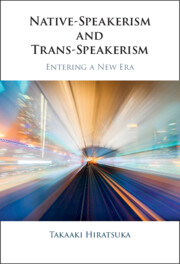
-
Select format
-
- Publisher:
- Cambridge University Press
- Publication date:
- August 2024
- October 2024
- ISBN:
- 9781009512916
- 9781009512923
- Dimensions:
- (229 x 152 mm)
- Weight & Pages:
- 0.27kg, 176 Pages
- Dimensions:
- Weight & Pages:
- Subjects:
- Teacher training and professional development, Applied Linguistics, Education, Language and Linguistics
You may already have access via personal or institutional login- Subjects:
- Teacher training and professional development, Applied Linguistics, Education, Language and Linguistics
Book description
Native-speakerism is a deeply embedded prejudice that perpetuates unequal power dynamics in language education. By introducing the liberating concept of trans-speakerism, this innovative book dismantles prevalent biases and reshapes the discourse in the field. It proposes inclusive designations such as global speaker of English (GSE), global teacher of English (GTE), and global Englishes researcher (GER), and urges a shift away from labels that maintain marginalization. By systematically reviewing previous studies, it challenges native-speakerism, and seeks to advance diversity, equity, and inclusion for all language speakers, teachers and researchers – transcending the limitations imposed by speakerhood statuses. The volume features the voices of non-native English-speaking (NNES) secondary school teachers, graduate students, and university professors in Japan, highlighting the strengths, interests, and uniqueness of language practitioners and researchers – both intellectually and emotionally. It ultimately encourages all language educators, researchers, and policymakers to oppose biases, welcome linguistic diversity, and develop inclusive language education environments.
Reviews
‘Hiratsuka (2024) offers an incisive, critical, and engaging treatments of native-speakerism, a long-standing topic of debate in the field of applied linguistics. This topic has garnered significant attention in research for many years, so we were pleasantly surprised to encounter refreshingly new perspectives in this book. Hiratsuka has identified a meaningful way to move beyond the traditional dichotomy of native vs. non-native speakers in the field … Hiratsuka has planted the seed of a powerful idea - trans-speakerism - that empowers non-native speakers to speak back and take control of English language pedagogy. We hope that further work will emerge to develop, implement, and advocate for trans-speakerism in the field of applied linguistics.’
Source: System
‘This much-needed and powerful monograph offers valuable insights into the impact of native-speakerism and trans-speakerism in the field of English language education, as demonstrated by the diverse narratives presented from both non-native teachers and students. By reading the stories in the book, readers, particularly traditional non-native English speakers, can not only see themselves reflected, but also gain a sense of empowerment in their professional development.’
Fan Fang - Professor, Shantou University
‘Hiratsuka puts forward a compelling case for trans-speakerism - an ideological stance that emphasizes the professional characteristics of language speakers, teachers, and researchers. The book offers readers valuable conceptual and methodological tools to contest native-speakerism, and thus reframe language education in asset-based terms.’
Peter I. De Costa - Professor of Applied Linguistics, Michigan State University
‘This book is a must-read for anyone who envisions a more inclusive future for English teaching-one that transcends the outdated dichotomy between native and nonnative speakers. Featuring perspectives from EFL teachers, graduate students, and academic faculty in Japan, it offers a compelling call to action for educators and researchers around the world to unite and rethink the global teaching of English. May the voices of those on the periphery be heard -thoughtful, truthful, and transformative.’
Yasuhiro Fujiwara - Professor, Meijo University
Contents
Metrics
Altmetric attention score
Full text views
Full text views help Loading metrics...
Loading metrics...
* Views captured on Cambridge Core between #date#. This data will be updated every 24 hours.
Usage data cannot currently be displayed.
Accessibility standard: Unknown
Why this information is here
This section outlines the accessibility features of this content - including support for screen readers, full keyboard navigation and high-contrast display options. This may not be relevant for you.
Accessibility Information
Accessibility compliance for the PDF of this book is currently unknown and may be updated in the future.


